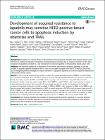| dc.identifier.citation | Eustace, A.J., Conlon, N.T., McDermott, M.S.J., Browne, B.C., O'Leary, P., Holmes, F.A., Espina, V., Liotta, L.A., O'Shaughnessy, J., Gallagher, C., O'Driscoll, L., Rani, S., Madden, S.F., O'Brien, N.A., Ginther, C., Slamon, D., Walsh, N., Gallagher, W.M., Zagozdzon, R., Watson, W.R., O'Donovan, N. & Crown, J., Development of acquired resistance to lapatinib may sensitise HER2-positive breast cancer cells to apoptosis induction by obatoclax and TRAIL., BMC Cancer, 18, 1, 2018 | en |
| dc.description.abstract | Background: Lapatinib has clinical efficacy in the treatment of trastuzumab-refractory HER2-positive breast cancer. However, a significant proportion of patients develop progressive disease due to acquired resistance to the drug. Induction of apoptotic cell death is a key mechanism of action of lapatinib in HER2-positive breast cancer cells.
Methods: We examined alterations in regulation of the intrinsic and extrinsic apoptosis pathways in cell line models of acquired lapatinib resistance both in vitro and in patient samples from the NCT01485926 clinical trial, and investigated potential strategies to exploit alterations in apoptosis signalling to overcome lapatinib resistance in HER2-positive breast cancer.
Results: In this study, we examined two cell lines models of acquired lapatinib resistance (SKBR3-L and HCC1954-L) and showed that lapatinib does not induce apoptosis in these cells. We identified alterations in members of the BCL-2 family of proteins, in particular MCL-1 and BAX, which may play a role in resistance to lapatinib. We tested the therapeutic inhibitor obatoclax, which targets MCL-1. Both SKBR3-L and HCC1954-L cells showed greater sensitivity to obatoclax-induced apoptosis than parental cells. Interestingly, we also found that the development of acquired resistance to lapatinib resulted in acquired sensitivity to TRAIL in SKBR3-L cells. Sensitivity to TRAIL in the SKBR3-L cells was associated with reduced phosphorylation of AKT, increased expression of FOXO3a and decreased expression of c-FLIP. In SKBR3-L cells, TRAIL treatment caused activation of caspase 8, caspase 9 and caspase 3/7. In a second resistant model, HCC1954-L cells, p-AKT levels were not decreased and these cells did not show enhanced sensitivity to TRAIL. Furthermore, combining obatoclax with TRAIL improved response in SKBR3-L cells but not in HCC1954-L cells.
Conclusions: Our findings highlight the possibility of targeting altered apoptotic signalling to overcome acquired lapatinib resistance, and identify potential novel treatment strategies, with potential biomarkers, for HER2-positive breast cancer that is resistant to HER2 targeted therapies. | en |




